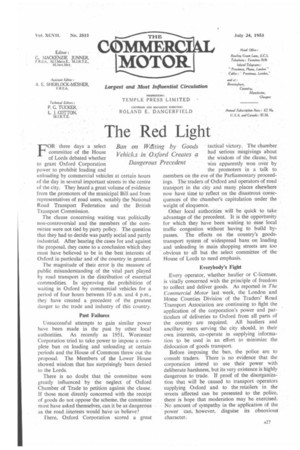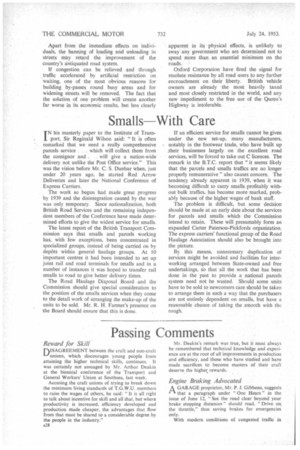The Red Light
Page 29

Page 30

If you've noticed an error in this article please click here to report it so we can fix it.
FOR three days a select committee of the House of Lords debated whether to grant Oxford Corporation power to prohibit loading and unloading by commercial vehicles at certain hours of the day in several important streets in the centre of the city. They heard a great volume of evidence from the promoters of the municipal Bill and from representatives of road users, notably the National Road Transport Federation and the British Transport Commission.
The clause concerning waiting was politically non-controversial and the members of the committee were not tied by party policy. The question that they had to decide was partly social and partly industrial. After hearing the cases for and against the proposal, they came to a conclusion which they must have believed to be in the best interests of Oxford in particular and of the country in general.
The magnitude of their error is the measure of public misunderstanding of the vital part played by road transport in the distribution of essential commodities. In approving the prohibition of waiting in Oxford by commercial vehicles for a period of four hours between 10 a.m. and 4 p.m., they have created a precedent of the greatest danger to the trade and industry of this country.
Past Failures Unsuccessful attempts to gain similar power have been made in the past by other local authorities. As recently as 1951, Worcester Corporation tried to take power to impose a complete ban on loading and unloading at certain periods and the House of Commons threw out the proposal. The Members of the Lower House showed wisdom that has surprisingly been denied to the Lords.
There is no doubt that the committee were greatly influenced by the neglect of Oxford Chamber of Trade to petition against the clause. If those most directly concerned with the receipt of goods do not oppose the sChethe, the committee must have asked themselves, can it be as dangerous as the road interests would have us believe?
There, Oxford Corporation scored a great tactical victory. The chamber had serious misgivings about the wisdom of the clause, but was apparently won over by the promoters in a talk to members on the eve of the Parliamentary proceedings. The traders of Oxford and operators of road traniport in the city and many places elsewhere now have time to reflect on the disastrouS consequences of the chamber's capitulation under the weight of eloquence.
Other local authorities will be quick to take advantage of the precedent. It is the opportunity for which they have been waiting to ease local traffic congestion without having to build bypasses. The effects on the country's goodstransport system of widespread bans on loading and unloading in main shopping streets are too obvious to all but the select committee of the House of Lords to need emphasis.
Everybody's Fight Every operator, whether haulier or C-licensee, is vitally concerned with the principle of freedom to collect and deliver goods. As reported in The Commercial Motor last week, the London and Home Counties Division of the Traders' Road Transport Association are continuing to fight the application of the corporation's power and particulars of deliveries to Oxford from all parts of the country are required. All hauliers and ancillary users serving the city should, in their own interests, co-operate in supplying information to be used in an effort to minimize the dislocation of goods transport.
Before imposing the ban, the police are to consult traders. There is no evidence that the corporation intend to use their power with deliberate harshness, but its very existence is highly dangerous to trade. If proof of the disorganization that will be caused to transport operators supplying Oxford and to the retailers in the streets affected can be presented to the police, there is hope that moderation may be exercised. No amount of sympathy in the application of the power can, however, disguise its obnoxious character. Apart from the immediate effects on individuals, the banning of loading and unloading in streets may retard the improvement of the country's antiquated road system.
If congestion can be relieved and through traffic accelerated by artificial restriction on waiting, one of the most obvious reasons for building by-passes round busy areas and for widening streets will be removed. The fact that the solution of one problem will create another far worse in its economic results, but less clearly apparent in its physical effects, is unlikely to sway any government who are determined not to spend more than an essential minimum on the roads.
Oxford Corporation have fired the signal for resolute resistance by all road users to any further encroachment on their liberty. British vehicle owners are already the most heavily taxed and most closely restricted in the world, and any new impediment to the free use of the Queen's Highway is intolerable.




























































































